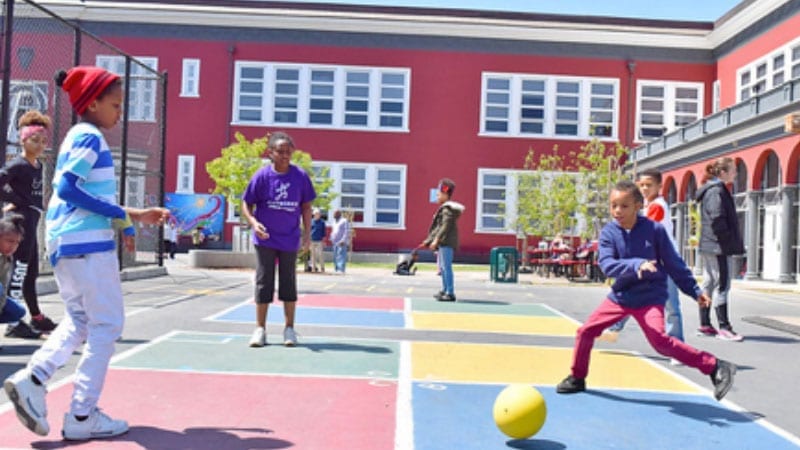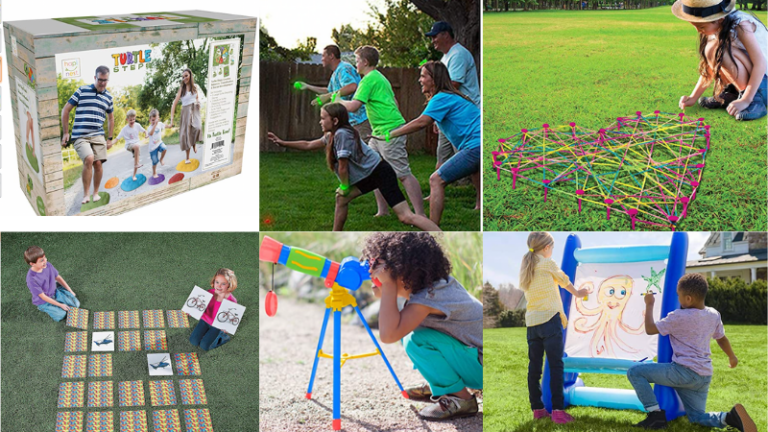playworkIf you go outside to observe school recess today, what will you see? Are kids snickering when a student kicks the ball and misses or are they giving high-fives and saying, “Good job, nice try!” Is the basketball court filled with a sea of boys or are girls joining in too? How are conflicts resolved when it isn’t clear whose turn is next—by pushing and shoving or by using rock, paper, scissors?
And what does this recess environment say about your school culture? Chances are, whatever you see happening outside is also happening inside. Students bring their negative or positive energy from recess back into your school’s classrooms and hallways.
Here are three ways schools are improving their school culture by partnering with Playworks, an organization that helps schools positively transform recess.

1. Adults Actively Play Games with Students
Peter Wilson, the principal at Burbank Elementary in Hayward, California, used to describe school recess as chaotic. “A lot of kids would get in trouble and get hurt.” The school had a total of 118 suspension days in a year due to discipline issues, and Wilson knew something had to be done. He and about 12 teachers and recess staff began monthly training and regular consultations with Playworks, and as a result, that number plummeted to only 44.
The trainings aren’t your average professional development workshops. Adults have fun, actively learning in their tennis shoes by playing recess games and creating a recess action plan. The staff at Burbank Elementary got to practice the fun, playful strategies that they eventually modeled for students on the playground.
Adults didn’t stop playing after the trainings either—they continue to take an active role in playing with students at recess. In fact, at Burbank Elementary, it’s not just the school recess staff that play games like Helping Hands Tag or Switch. The assistant principal himself has become a regular participant in his school’s playground games. Wilson leads by example; he positively impacts his school’s culture by modeling the type of behavior he hopes to see from both staff and students.
“I’d rather go out and be present outside, active and involved spending 15 minutes playing every day instead of spending 30–45 minutes suspending a kid,” says Wilson. “Now, part of my job is to play with kids and teach them how to play instead of laying down the law.”

2. Students Practice Empathy on the Playground
During school recess, Matthew Harris, principal of John F. Kennedy Elementary School in Daly City, California, used to observe his students fighting over everything from space on the blacktop to positions in line to who’s friends with whom. While many of these conflicts started on the playground, they persisted in the classroom. This wasn’t the school culture he wanted, so Harris decided to partner with Playworks to help students practice empathy at recess, with the hope that the life skills students used on the playground would transfer into classrooms.
Coach Wayne, JFK’s Playworks site coordinator, helped school recess staff and students learn how to lead inclusive games, share their space, and resolve conflicts with roshambo (a.k.a. Rock-Paper-Scissors). He also trained junior coaches—4th and 5th graders—to model positive behavior for younger students by leading inclusive games.
“Now, a student who used to be in my office constantly for getting into fights is one of the most proactive in asking other kids to join in,” says Harris. “Kindness begets kindness; we’ve seen more students wanting to help out for the sake of being helpful.”
Harris has seen improvements that go beyond the school yard. When conflicts are resolved before students leave the playground, issues that have been lingering since recess don’t interrupt teachers’ lessons. In fact, a study by Mathematica Policy Research and Stanford University shows that time teachers spend transitioning students back to class after recess decreased by 34% in schools that use Playworks.
The positive changes at JFK, however, didn’t stop there—Harris says he’s also seen a positive change in school culture. “At the school level, promoting empathy creates an environment in which students feel safe, respected, and ready to learn.”

3. School Recess Support Staff Feel Empowered
When you’re building a positive school culture, remember your support staff. In Rochester City, New York, more than 400 adults from across Rochester School District, including countless support staff, partnered with Playworks to help transform the school recess programs at their schools.
Only one in three schools in the Rochester School District offered recess—most of those did not offer recess daily. The Greater Rochester Health Foundation decided to work with Healthi Kids, a community-based grassroots coalition that encourages daily play, to revamp the district’s wellness policy with a goal of ensuring that every child receives 20 minutes of school recess every day.
This meant that many of the district’s lunch aides had to be trained to monitor recess. The Playworks trainers inspired everyone who participated in their workshops, from teachers to recess supervisors to lunch aides, to all take an active role as teachers on the playground to make a difference in the lives of the students.
“I think my favorite story that came out of the workshops was listening to the lunch aides. They learned that they are actually teachers too,” said Erick Stephens from Healthi Kids. “No one had ever told them that before. Playworks empowered them to look at their jobs from a different perspective and for them to say, ‘Yeah I do matter, I do make a difference in the lives of these children.’”
Be sure to download your free Recess Heroes Posters to promote positive play at your school by hanging them in your lunchroom or the hallway leading out to the playground!



